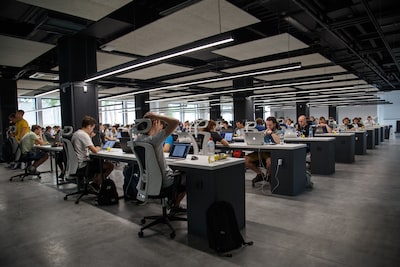How can Crowdsourcing Lead to Business Innovation without Investment?

By tapping into the collective intelligence of the masses, businesses can source ideas, designs, and even funding, bypassing the need for traditional capital.
Crowdsourcing, the practice of engaging a ‘crowd’ or group of people to contribute to a specific task or project, has emerged as a powerful tool for businesses. By tapping into the collective intelligence and expertise of a large number of participants, businesses can foster innovation, refine ideas, and even solve complex problems without substantial financial investments.
Below, we blend global and UAE-specific examples to highlight the potential of crowdsourcing:
Wikipedia: Perhaps the most famous example of crowdsourcing is Wikipedia. It transformed the traditional encyclopedia model by allowing users globally to create, edit, and update content, resulting in a comprehensive and continually evolving knowledge repository.
Dubai Future Foundation: The foundation has initiated several challenges and competitions, encouraging participants from around the globe to propose innovative solutions for the city’s future. It’s a way to gather diverse perspectives and ideas without heavy investments in research and development.
LEGO Ideas: LEGO taps into its vast fanbase to source new product ideas. Fans can submit their designs, and if they gather enough community support, LEGO reviews and potentially produce the set. It’s crowdsourcing that transforms customer input directly into marketable products.
Threadless: This online apparel company lets artists submit T-shirt designs, which the community then votes on. Winning designs get produced and sold, with the artists earning a commission. This model minimizes risks associated with product design while engaging a broad creative community.
Smart Dubai’s Global Blockchain Challenge: Encouraging startups worldwide to present blockchain solutions for diverse sectors, this challenge exemplifies how crowdsourcing can be employed to discover breakthroughs in emerging technologies.
InnoCentive: A platform where businesses can post challenges for a broad community of solvers. From scientific dilemmas to technological hurdles, it allows companies to tap into external expertise without hiring full-time experts.
Duolingo: While it started as a language-learning app, Duolingo leverages its users to translate web content. As users learn and translate sentences, they effectively contribute to content translation projects for third-party clients.
‘Drones for Good’ Award: Launched by the UAE government, this competition seeks innovative proposals for beneficial drone technology applications. It’s an avenue to crowdsource advancements in drone tech without internal R&D expenditures.
Masdar’s Engage Blogging Contest: As part of its commitment to sustainability, Masdar hosts blogging contests seeking global perspectives on pressing environmental issues. It’s a way to crowdsource fresh insights and ideas on sustainable development.
UAE – RTA’s Hamdan Bin Mohammed Award for Innovation in Project Management: Launched by Dubai’s Roads and Transport Authority, this award incentivizes global innovators to present groundbreaking ideas in project management, effectively crowdsourcing solutions for better infrastructure and transportation projects.
In a world that’s increasingly interconnected, crowdsourcing stands out as a strategy that breaks geographical, cultural, and professional barriers. As showcased by both global and UAE-centric examples, businesses can harness the collective prowess of diverse groups, driving innovation without heavy financial commitments.
This democratization of idea generation is a testament to the age-old adage: “Many hands make light work,” or in this case, “Many minds make bright ideas.




